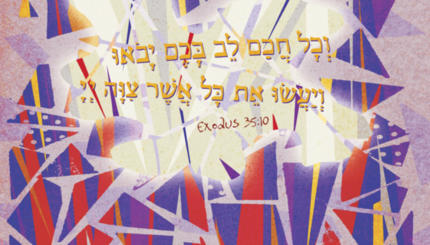Do you have any idea how many times I have had the “No, Hanukkah actually is NOT the Jewish version of Christmas” conversation in my lifetime?
It usually begins with me having to explain that I don’t celebrate Christmas. Only Hanukkah.
“But you’re half-black,” people often say.
I explain that while I am half-black, that does not mean that I am half-Jewish. I am all Jewish, and we don’t celebrate Christmas. Only Hanukkah.
Once we get past that, we talk about dreidel—and my conspiracy theory that my brother-in-law somehow has figured out how to cheat, perhaps with a loaded dreidel like the dice in Oceans Thirteen.
We talk about latkes—and my firm belief that only in my beloved late Bubbie’s very old, expertly tempered pan do they come out perfect every single time.
And, of course, we talk about gifts—and that, as much as it pains me to say so, Hanukkah isn’t about receiving gifts for eight nights in a row.
“Well, then what is it about?”
A couple of weeks ago, I found myself beginning, almost by rote, to speak about the holiday in terms of the Hanukkah buzzwords. Light. Oil. Maccabees. Miracles. And an incredibly brave battle for religious freedom.
When I stopped to take a breath and consider what I was saying, it struck me that, really, Hanukkah is about the miracle and light of unapologetic, fearless authenticity.
Yes, their battle was one for religious freedom. But what the Maccabees were really fighting for is what so many of us are currently demanding.
The freedom to live…love…worship…as we wish.
I think of what is going on in our country with regard to immigrants seeking a safer life. I think of the LGBTQ+ community working tirelessly to be treated with the same dignity and respect as other Americans. I think of the many, many communities of color in America who are demanding greater representation in every possible place, from politics to Hollywood.
All of them—all of us—simply wanting to be seen.
And why? Because much like what Judah and the Maccabees faced, we find ourselves in an age where government is working overtime to limit authenticity. To criminalize it. To punish it.
As a mixed-race Jewish woman, I know deeply how terrifying it can be to live from a wholly authentic place. Especially in a time when, increasingly, people are not hesitating to lash out viciously in every possible way – on the internet, in grocery stores, on airplanes, in synagogues, with words, with torches, with fists, with guns.
All because someone is different from what they are.
And yet, I find as I grow older, I cannot deny my authentic self. I will not.
Much like the Maccabees, I believe that authenticity, that individuality, is something worth fighting for.
It is what I am living for.
People do not always like what I have to say when I am speaking my truth. They don’t understand how I can exist at an intersection where race and religion co-exist in a way that does not make sense to them. Those people do not find me to be brilliant. Nor do they find me to be beautiful.
But I know who I am. And I have never celebrated my authenticity as unapologetically I have come to in the last year. My voice. My point of view. My beauty. My body. My skin color. My Judaism.
In America, we have never needed Hanukkah more. And I have never appreciated the true breadth of the miracle of the holiday more.
If that doesn’t merit some sufganiyot, I don’t know what does.



